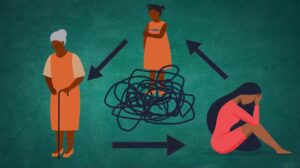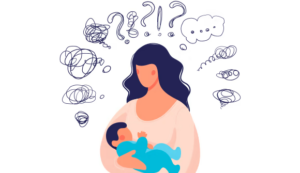Do you ever wake up in the middle of the night and wonder if you do have a similarly sleepless friend that might be up for a game of Grand Theft Auto?
You are certainly not alone when it comes to waking up with anxiety in the middle of the night and being unable to fall back to sleep because your mind is racing with all the things you have got on your to-do list.
In the middle of the night, we do know sleepless panic cycles too well, but why do we wake up in the first place and suddenly go into panic mode?
Panic attacks are not simply moments of anxiety, thinking about the deadline that is coming up a little faster than you would like. Feeling shaky, short of breath or dizzy can be a sign that you are having a panic attack.
There are also physiological effects of panic attacks including an increased heart rate and vascular reactions that can lead to a tingly sensation. Panic attacks can come on completely without warning.
After experiencing something traumatic that led you to panic, your subconscious mind can mimic that pattern and send you into panic mode, once you are removed from the situation.
Panic attacks in the middle of the night can be bought on at the subconscious level, you do not have to be awake to experience one. Panic attacks can hit when you are asleep, sometimes sparked by dreams or nightmares that call back to the same subconscious patterns that bring panic attacks for no reason.
The psychological and physiological reactions-rapid heart rate, shortness of breath, dizziness, and sweating can adhere to waking up with anxiety in the middle of the night and persisting for minutes. This can start a cycle of insomnia where you worry about what will happen if you lose sleep, but cannot sleep, so you worry more. Being isolated in a dark, quiet room (i.e., your bedroom at night) does not help alleviate the sudden stress of waking up in a panic. Dealing with panic attacks is not that easy.
Anxiety and panic attacks in the middle of the night can bring some crazy and frightening symptoms and reactions. It will be uncontrollable. On such nights, the person jumps up in bed and becomes comforted with all nights of terrifying symptoms at pretty much their peak of intensity. Those nocturnal panic attacks convinced the patient that something was wrong and something serious had happened or was going to happen. The patient’s heart will be pounding hard. He or she can feel every beat in the ears, stomach, and even fingertips. The person’s chest would be tight and would be gasping for air. They also have difficulty talking.
For anyone dealing with panic attacks and anxiety disorders, one needs to understand very well how scary and devastating the physical symptoms can be especially when they come out of nowhere and these nocturnal panic attacks hit you in the face.
Only a true understanding of anxiety and what it can do to you will pave the way to lasting recovery.
A nocturnal panic attack is similar to a regular panic attack. The major difference is that there is no conscious build-up of the actual attack which does not mean that there is no build-up at all. Nocturnal panic attacks normally occur when you go to bed highly stressed and anxious. The stress levels are extremely elevated and possibly even close to panic but somehow, we still manage to fall asleep in this state. Anxiety disorder patients are so used to extremely high-stress levels that they feel normal to be stressed. So, while we are sleeping, our mind is very active and can even trigger further stress because it is happening subconsciously. The symptoms in their most extreme form are just there with nothing to remotely justify them. Tips to break the midnight insomnia cycle. Experts say that getting out of bed, out of your bedroom, and doing something to dispel negative thoughts until you are really tired is best enough to fall asleep.
A night of good sleep is very vital for your health. Are you struggling to get enough sleep at night because of this? If so, let us find out what may be interfering with your natural sleep patterns.
Lifestyle Choices-How much of your daily and nightly routine, do you build around ensuring a good night’s sleep? The daily and nightly routines will help determine how well you sleep at night.
These five things can disturb your sleep patterns.
- a) Drinking caffeine or alcohol before going to bed.
- b) Eating food right before bedtime.
- c) Staying up late on your phone or computer.
- d) Taking a nap too late in the day.
- e) Smoking.
Though we all want to stay up to date on Instagram, Twitter, and Tik Tok. When you stay up late, checking your feed and scrolling through your phone, it will only make getting to sleep that much harder for you. If you lie down and take a nap in the late afternoon or early evening, you will be too alert and awake by bedtime and not be able to go to sleep. If you struggle with waking up at 3 am every night with anxiety, think about your daily and nightly routines and try to weed out some bad habits that may be stopping you from getting proper sleep at night. If you make the changes you need for a good night’s rest, then you will be well on your way to sleeping through the night.
- Your emotional state-can you recall a time when you slept well every single night? Your emotional state has a significant impact on how you sleep and your quality of sleep. Your emotional state can be left in turmoil if you are experiencing a time of heightened stress or anxiety and this can lead to sleep disturbances.
- Stress and anxiety trigger your ingrained fighter feeling and this will elevate your heart rate, quicken your breathing and increase the stress hormones in your body. All of which makes it more difficult for you to sleep more peacefully. If you are struggling with sleep and anxiety in your life, try a guided meditation before bedtime. Deep breathing exercises are regarded as the best measure in helping get relaxed enough for sleep. Taking a hot shower or bath will help you to destress and wind down properly for bedtime. These tips can aid you with your stress or anxiety and in turn, will help you to fall and stay asleep.
- Low blood sugar-Did you know that low blood sugar can cause your brain to wake you up in the middle of the night? The brain is very active during the night as it regenerates, repairs, and converts your short-term memories into long-term memories while you sleep. However, since it is so active during the night, it also uses up a lot of your energy reserves. If you suffer from low blood sugar levels, your brain will consume most of your energy reserves and think that you have run out of fuel. As a result, your brain will release cortisol, to make you hungry and wake you up so you can go and get something to eat.
If you find yourself continuously waking up with anxiety in the middle of the night and going to the kitchen to binge on a midnight snack, you may have low blood sugar levels and this might be the cause of your sleep disturbances.
To conclude, there is a way to stop fighting anxiety in your mind because anxiety does not like to go easily. Just say to anxiety, I do not want to argue when it (anxiety) is blowing out of proportion. Repeat it to yourself and then relax to fall asleep.
Feel free to reach out to us for counseling and psychotherapy sessions from our trained psychologists, and psychotherapists.




